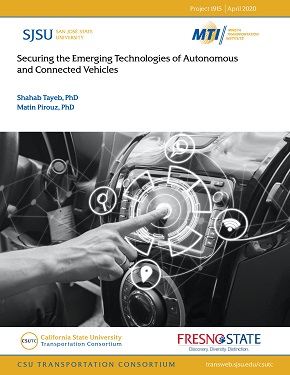- 408-924-7560
- mineta-institute@sjsu.edu
- Donate
Securing the Emerging Technologies of Autonomous and Connected Vehicles
The Internet of Vehicles (IoV) aims to establish a network of autonomous and connected vehicles that communicate with one another through facilitation led by road-side units (RSUs) and a central trust authority (TA). Messages must be efficiently and securely disseminated to conserve resources and preserve network security. Currently, research in this area lacks consensus about security schemes and methods of disseminating messages. Furthermore, a current deficiency of information regarding resource optimization prevents further efficient development of this network. This paper takes an interdisciplinary approach to these issues by merging both cybersecurity and data science to optimize and secure the network. The proposed method is to apply Prim’s algorithm to an existing vehicular security scheme, Privacy-Preserving Dual Authentication Scheme (PPDAS), to further network efficiency in terms of power and time consumption. When a dual authentication security scheme is in place, the time taken for message dissemination follows a quadratic growth; applying Prim’s algorithm to the security scheme reduces the time to disseminate messages to a linear growth. The number of messages sent was decreased by a magnitude of up to 44.57. Contemporary security schemes are compared with PPDAS to justify the overhead consumption. Through the proposed approach, the usage of network resources, such as power and time, is reduced, which substantially enhances the performance of the vehicular network and allows for the scalability of the IoV.
DR. SHAHAB TAYEB
Dr. Shahab Tayeb is a faculty member with the Department of Electrical and Computer Engineering in the Lyles College of Engineering at California State University, Fresno. Dr. Tayeb’s research expertise and interests include network security and privacy, particularly in the context of the Internet of Vehicles. His research incorporates machine learning techniques and data analytics approaches to tackle the detection of zero-day attacks. Through funding from the Fresno State Transportation Institute, his research team has been working on the security of the network backbone for Connected and Autonomous Vehicles over the past year. He has also been the recipient of several scholarships and national awards including a U.S. Congressional Commendation for STEM mentorship.
DR. MATIN PIROUZ
Dr. Matin Pirouz is a faculty member with the Department of Computer Science at California State University, Fresno. Dr. Pirouz’s research current interests include CS Education, big data analytics, social network analysis, and data mining. Her current projects include applying prescriptive and descriptive analyses. Her research has been funded by the National Science Foundation and other federal, state, and private funding agencies.
-
Contact Us
San José State University One Washington Square, San Jose, CA 95192 Phone: 408-924-7560 Email: mineta-institute@sjsu.edu






